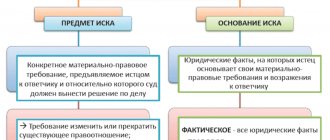After a family breakdown, it may be necessary to file a claim to evict the owner's former family member. Of course, such disputes raise many conflicts. And the court can put an end to the resolution of the dispute.
The information posted on the website will help you correctly prepare and draw up documents for the court, provide evidence in a civil case. The assistance of the site’s on-duty lawyer may also be helpful. Only the owner (tenant) of the property can make a decision to go to court with such a claim or leave the situation as it is.
To fill out a statement of claim, you need to download its sample provided on the website and use the recommendations for drafting it.
:
Statement of claim for eviction of a former family member of the owner
Grounds for eviction
The loss of family ties in itself is grounds for eviction, but in a specific situation is it possible to kick a former spouse out of the apartment? Let's consider cases when it is possible to discharge a former spouse, and when this would be contrary to the law.
Can't evict
A spouse cannot be evicted from a residential premises in the following cases:
- if the apartment belongs to him by right of ownership and was acquired before marriage;
- if a share in an apartment acquired during marriage belongs to the ex-husband;
- if he is a tenant of a municipal apartment before marriage;
- if he is a user of official housing, to which the spouse does not have rights.
Eviction possible
You can evict an apartment if the owner is a spouse, children or third parties, and the former spouse was simply registered in it or lived without registration at all. Difficulties with eviction of such a person can arise only in cases where:
- he is disabled;
- he is declared incompetent.
Although such eviction is possible, it will require the involvement of not only the justice authorities, but also the guardianship authorities.
You can read more about the grounds for kicking your ex-husband out of the apartment in this article.
Rules for filing a claim
In accordance with the rules of jurisdiction, eviction claims are considered by district or city courts of first instance. The plaintiff must determine which specific district (city) court to file the claim on his own, based on the location of the disputed residential premises.
In other words, the claim is filed with the judicial authority within whose jurisdiction the apartment from which you intend to evict your ex-spouse is located.
A plaintiff can file a claim in three ways:
- Personally visit the judicial authority and submit a package of documents to the court office.
- Entrust the filing of a claim to your representative. This can be any trusted person - a relative, a lawyer, a representative of interested services.
- Send a package of documents by registered mail with notification (with a mandatory list of attachments).
After receiving the package of documents, the office registers them and transfers them to the judge. If the court accepts the claim for consideration, then five days after filing the claim, all parties receive notice of the date of the preliminary hearing in the case.
The court may leave the claim without motion and return it to the plaintiff, as well as refuse to consider the case. In what cases does this happen? The court will return the claim if:
- a decision has already been made on this claim, for example, the court retained the former spouse’s right to use the disputed residential premises;
- the rules for drawing up and filing a statement of claim were violated;
- the plaintiff has been declared incompetent by the court, in which case he cannot go to court on his own;
- the jurisdiction of the case is violated (the claim is filed in a court that is not located in the territory of jurisdiction of the particular case), in this case the plaintiff will receive notification of which court is competent to consider the claim.
To summarize:
- Eviction lawsuits are filed in the district court at the defendant’s place of residence.
- The basis for eviction is termination of the right to use the residential premises.
- Before filing a claim, you must try to resolve the problem out of court.
- If you do not have special legal knowledge, it is advisable to seek qualified assistance from a lawyer.
- The assistance of a lawyer may be needed at any stage: from the correct drafting of an eviction notice and subsequent statement of claim to the full management of the case by a legal representative at all its stages.
- If the court decides positively, all legal costs are usually borne by the defendant.
FREE CONSULTATIONS are available for you! If you want to solve exactly your problem, then
:
- describe your situation to a lawyer in an online chat;
- write a question in the form below;
- call Moscow and Moscow region
- call St. Petersburg and region
Save or share the link on social networks
Author of the article
Natalya Fomicheva
Website expert lawyer. 10 years of experience. Inheritance matters. Family disputes. Housing and land law.
Ask a question Author's rating
Articles written
513
- FREE for a lawyer!
Write your question, our lawyer will prepare an answer for FREE and call you back in 5 minutes.
By submitting data you agree to the Consent to PD processing, PD Processing Policy and User Agreement
Useful information on the topic
2
Eviction from an apartment for non-payment of utilities
In almost every family there are circumstances when the financial situation is drastic...
Cancellation of apartment privatization
Abolition of privatization, also known as deprivatization or deprivatization, is...
12
The procedure for forced eviction from an apartment by court decision
The court decided to evict a citizen from the residential property he occupied...
Privatization of leased land
Privatization of a leased land plot will allow its owner to use it for any purpose...
Privatization of land under the garage
You can privatize not only apartments or houses, but also land...
Judicial eviction with provision of other residential premises
If a citizen must move out of a residential area, but does not want to...
How to file a claim
The statement of claim for the expulsion of the ex-husband from the home is drawn up in writing. At the same time, there are no requirements regarding whether it will be a handwritten text or typed on a computer. The main thing is that the judge can read it easily. If the handwriting is illegible, then the court may generally refuse to accept such a document.
When drawing up a claim, a certain structure must be followed. Let's take a closer look at it.
Introductory part
At the very beginning of the application, in the upper right corner, the following information is indicated:
- the exact name of the court where the application is being filed;
- personal and contact information of the plaintiff;
- the most accurate and voluminous data of the defendant;
The name of the claim should be located in the center. It is determined by the requirements that are stated.
Descriptive part
In this part it is necessary to set out all the circumstances of the dispute, namely:
- who owns the apartment;
- when the marriage was concluded and dissolved;
- whether the spouse was registered in the apartment;
- whether there was an attempt at pre-trial reconciliation;
- why the spouse does not want to move out of the apartment;
- whether there are children, with whom they live after the divorce;
- whether there was a division of property during the divorce, whether the apartment was divided, whether the court decision on this entered into legal force.
Often, ex-spouses do not maintain good relationships, however, despite all the existing personal disagreements, you should not be overly emotional in describing the controversial situation. Adhere to a formal business style of presentation.
The operative part
Here it is necessary to summarize the descriptive part, that is, to put forward your requirements. They can be like this:
- recognize the ex-husband as having lost the right to use the apartment (if he was registered in it);
- evict the defendant from the apartment.
Both of these requirements can be put forward, it all depends on the specific situation. It is worth remembering that each claim must be supported by references to legal acts and documents.
Final part
This part lists all the documents attached to the claim and their number, and indicates the witnesses whom you want to summon to court.
At the end, the personal signature of the plaintiff and the date of drawing up the document are placed.
The application is drawn up in three copies - to the court, to the plaintiff and to the defendant.
The rights of family members of the homeowner: how they arise and when they cease
April 29, 2021 3:52 pm
Lawyers were told about new legal structures that can be used to protect housing rights along with existing instruments of civil and housing legislation
On April 29, the Federal Chamber of Lawyers of the Russian Federation held another training webinar for lawyers. Irina Emelkina , Professor of the Department of Private Law Disciplines, Academic Director of the National Research University Higher School of Economics master's program "Lawyer in Civil and Criminal Cases", Doctor of Legal Sciences , who gave a lecture on the topic of the use of new obligatory structures in disputes between the owner of residential premises and members of his family .
At the beginning of her speech, the speaker noted that with the reform of the Civil Code of the Russian Federation in 2015, new legal structures were introduced: astrent (judicial penalty) and assurances of guarantee. These institutions are still being conceptualized by theorists and practitioners. They are primarily focused on the business environment, but they should also be used in protecting housing rights, along with existing instruments of civil and housing legislation.
In particular, according to Art. 308.3 of the Civil Code of the Russian Federation, in the event of a debtor’s failure to fulfill an obligation, the court, at the request of the creditor, has the right to award in his favor a sum of money in an amount determined on the basis of the principles of fairness, proportionality and the prevention of profiting from illegal or dishonest behavior. The lecturer explained that the Supreme Court of the Russian Federation, in Resolution of the Plenum of March 24, 2021 No. 7, established that not only obligations in kind can be secured by astrent in the event of non-execution of a court decision, but it can also be declared in case of a negative claim. This tool, added Irina Emelkina, is widely used in claims relating to rights to land plots.
The second design is assurances of obligations (Article 431.2 of the Civil Code of the Russian Federation), including those relating to the rights of citizens to residential premises. The lecturer drew attention to the fact that the notary community supported this design in protecting the rights of the purchaser of residential real estate if, after its alienation, the right to reside in this premises is retained by former members of the seller’s family. In this regard, civil contracts providing for the alienation of housing include clauses stating that the seller, as well as third parties (members of his family) guarantee the legal purity of the transaction. The speaker emphasized that damages for false information in this case are recovered not only from the seller, but also from third parties who provided these assurances.
According to Irina Emelkina, in the last decade the topic of the rights of family members of the owner of residential premises has given rise to many problems. The state had different attitudes to the provisions regarding what rights these individuals were endowed with. Thus, the speaker explained, in 1994, when the Civil Code of the Russian Federation was adopted, Art. 292 contained a rule that family members of the owner of the property have the same rights to live there as the owner. In addition, it was stipulated that this right has the property of being followed, which gave rise to negative consequences for purchasers of residential real estate.
With the adoption of the new Housing Code of the Russian Federation, the rights of family members of the owner of a home during its alienation have changed. According to the new version of Art. 292 of the Civil Code of the Russian Federation, the rights to use alienated residential premises are not retained by family members of the seller. At the same time, the Housing Code of the Russian Federation established that persons who lived with the tenant of the residential premises at the time of privatization, who had the right to privatization, but did not use it, are endowed with an indefinite right to use the residential premises. Thus, this did not solve the problem for bona fide purchasers.
The speaker emphasized that the rights of family members of the homeowner are not defined as property rights in Russian legislation. Abroad, for example, they are characterized as personal easements.
In particular, the legal status of the owner’s family members is determined by Art. 292 of the Civil Code of the Russian Federation and Art. 31 Housing Code of the Russian Federation. Since there were serious gaps in the regulation of these relations, in 2009 the Plenum of the Supreme Court of the Russian Federation adopted Resolution No. 14 of July 2, where it tried to explain in detail issues related to the rights of family members of the homeowner, including former ones.
The lecturer drew attention to the fact that when considering disputes of this category, judicial discretion is widely used. In similar situations, some courts retain the right of former family members of the home owner to reside in the given residential premises, while others refuse. The whole point, Irina Emelkina emphasized, is in the evidence base. “In each case it is necessary to understand and clearly select evidence. In addition, the Constitutional Court of the Russian Federation has repeatedly pointed out the need to maintain a balance of interests when resolving such disputes,” she added.
The speaker noted that Art. 19 of the Federal Law of December 29, 2004 No. 189-FZ “On the entry into force of the Housing Code of the Russian Federation”, which established the indefinite right of residence for family members of the owner, including former ones, who at the time of privatization had equal rights with the tenant, gave consent to privatization, but did not take advantage of this right themselves. This rule protected the rights of such entities, but at the same time created problems for home buyers.
So, explained Irina Emelkina, according to Art. 31 of the Housing Code of the Russian Federation, the spouse, children, and parents living with him are recognized as members of the family of the owner of the residential premises. Other relatives, including disabled dependents and, in exceptional cases, other citizens, may be recognized as members of the owner’s family if they were installed by him as such. The Supreme Court of the Russian Federation, in turn, added that in order to recognize persons moved in by the owner as members of his family, it is sufficient to establish only the fact of their joint residence with the owner in a given residential premises (Resolution No. 14). At the same time, the court also needs to find out the will of the owner to move in these persons.
The speaker added that when considering such issues in practice, a problem arose: if family members of the owner of the property live in a given premises, but the owner does not, do the rules on the rights of family members to live apply? According to Art. 293 of the Civil Code of the Russian Federation - yes. In this case, the norms of the Housing Code of the Russian Federation are special and cannot exclude the effect of the provisions of the Civil Code of the Russian Federation.
The topic of the rights and obligations of family members of the homeowner, including those established by agreement between them, was also touched upon. The lecturer emphasized that capable and partially capable family members are jointly and severally liable with the owner for obligations arising from the use of housing, unless otherwise established by agreement. At the same time, she explained that, according to paragraph 4 of Art. 31 of the Housing Code of the Russian Federation, in the event of termination of family relations with the owner, the right to use this residential premises for the former family member is not retained, unless otherwise established by the agreement defining the procedure for using housing in such cases. This rule, noted Irina Emelkina, is dispositive. In this case, the agreement can be concluded both after the termination of family relations, and long before that (for example, upon marriage).
Regarding the rights of former family members of the owner, according to the speaker, judicial practice is replete with similar disputes. She drew attention to the fact that the issue of recognizing a person as a former family member of the homeowner in the event of a dispute is decided by the court, taking into account the specific circumstances of the case. In particular, the court should consider the possibility of preserving the former family member’s right to use residential premises for a certain period of time, regardless of whether they file a counterclaim for this. Irina Emelkina emphasized that the termination of family relations between the parents of a minor child living in residential premises owned by one of the parents does not entail the loss of the child’s right to use it.
However, the speaker noted, it should be remembered that the right of a family member of the owner, including a former one, terminates with the transfer of ownership of this residential premises to another person (Clause 5 of Article 31 of the Housing Code of the Russian Federation). “This circumstance actually destroys the rights of the former family member. All discussions about the possibility of preserving it on the basis of an agreement are broken by the act of free and unrestricted alienation by the owner of his property,” emphasized Irina Emelkina. If the former family member does not vacate the alienated premises voluntarily, the new owner has the right to demand his eviction in court.
In conclusion, the speaker analyzed judicial practice on disputes in this category.
The speaker's presentation can be found here, and the answers to questions can be found here.
Tatiana Kuznetsova
SharePrint Direct link to the material:
Share
Documents attached to the statement of claim for eviction of a spouse
In order to confirm the validity of your demands to evict your ex-spouse from the apartment, you must submit the following documents to the court:
- plaintiff's passport;
- documents on ownership of the disputed real estate;
- social rental agreement;
- certificate of divorce;
- children's birth certificates;
- apartment card;
- certificate of payment of state duty;
- other documents confirming your requirements (court decision on division of property, inheritance, etc.).
Documents are provided in copies, but originals may be required at the court hearing. The court may also request other documents that can confirm or refute the testimony of the parties to the legal dispute.
Related documents
- Statement of claim for recognition of a former family member as having lost the right to use residential premises and for eviction
- Statement of claim against the consumer service for compensation for damaged items and compensation for moral damage
- Statement of claim for the recovery of a penalty for delay in fulfilling the requirement to eliminate defects in the goods
- Statement of claim for recovery of the amount paid for goods of inadequate quality, recognizing the sale and purchase agreement as terminated
- Statement of claim for return of deposit and protection of consumer rights
- Statement of claim for payment of double the price of the damaged item, payment of a penalty and collection of a fine
- Statement of claim for bringing the home into proper condition, for recovery of damages, penalties and compensation for moral damage
- Statement of claim for termination of the contract with the travel agency and compensation for moral damage
- Statement of claim for a proportionate reduction in the purchase price and payment of a penalty
- Statement of claim for the exchange of defective goods (for termination of the sales contract and recovery of the amount paid)
- Statement of claim demanding a refund of money for a low-quality phone, payment of a penalty and compensation for moral damage
- Statement of claim demanding replacement of goods, payment of penalties and compensation for moral damage
- Statement of claim demanding replacement of the car and payment of a penalty
- Complaint against the Housing and Communal Services Management Company for the provision of utility services of inadequate quality
- Claim for the return of a phone of good quality purchased remotely from an online store
- Claim for termination of the purchase and sale agreement, return of money (simple)
- Claim for termination of the purchase and sale agreement
- Claim for a proportionate reduction in the cost of a tour package
- Claim requesting the return of funds unlawfully withheld
- Claim demanding payment of a penalty for violation of work deadlines
The process of eviction of ex-spouses
There are two scenarios for the development of events during eviction:
- Voluntary.
- Forced.
In the first case, the person with whom the family relationship has been terminated voluntarily leaves the apartment and is discharged from it if the registration was at the specified address. We draw your attention to the fact that refusal to deregister significantly limits the owner’s rights to dispose of residential premises. For example, when selling an apartment, buyers will probably pay attention to registered persons. In addition, some utility fees are calculated based on the number of persons registered in the apartment.
If the issue of vacating the living space cannot be resolved peacefully, the owner will have no choice but to go to court to protect his rights. Forced eviction is possible only by court decision. A sample eviction procedure is as follows:
- notification of the person: the former relative must be given a notification under his personal signature, which will set out the essence of the situation in free form. It is important that the person signs the notification, confirming receipt of the paper (the notification can also be sent by mail). In the text of the notification, indicate the period during which you expect a response;
- If, after the expiration of the period specified in the notification, the former relative has not moved out of the apartment and has not changed registration, the owner applies to the district court with a statement of claim. Based on the results of consideration of the claim, the court will make a decision on the basis of which the person will be obliged to leave the residential premises and register at a new place of residence.
Retention of the right to use residential premises
The court may well make a decision in favor of the non-owner; in particular, temporary permission to stay in the owner’s house is allowed in some situations (Clause 4 of Article 31 of the RF Housing Code).
Let's list them:
- when the defendants do not have their own property;
- not being able to rent an apartment;
- no money to buy housing;
- disability of the defendant;
- job loss;
- other noteworthy circumstances.
The period of residence is completely determined by the court (clause 4 of article 31 of the Housing Code of the Russian Federation).
Failure Cases
In some cases, the court may side with the defendant, because There are exceptions in which a person cannot be evicted from the owner’s apartment.
So, the court can rightfully refuse to evict a former family member in the following cases:
- if the defendant really has nowhere to live and there is no opportunity to rent housing. In this case, the court may take into account the difficult life situation and delay the eviction of the former family member;
- if the defendants in the case are a mother and a minor child. Let us remind you that the termination of family relations between spouses does not deprive their joint child of the right to a share in the property. Therefore, it is difficult to evict a child from his mother. Another question is that the child’s place of residence is determined by the place of residence of one of his parents, and more often after a divorce, children remain with their mother;
- if the former family member is incapacitated;
- if we are talking about the eviction of a person who has registered his share of an apartment subject to privatization to another family member who is the owner. Such a person retains the right to live in the apartment for life and cannot be evicted.
A court decision can always be appealed to a higher authority, but the above cases, for the most part, are not subject to appeal.
Eviction resulting from the loss of family ties may be complicated by the presence of a property connection between former relatives, for example, shared ownership of property. In this article, we examined the issue of eviction of persons who are not homeowners.
If you found this page useful, please recommend it to your friends:
Stages of enforcement proceedings and eviction by bailiffs
The court verdict serves as the basis for enforcement proceedings in the eviction process. Only bailiffs have the right to enforce a court decision, guided by Federal Law No. 229 “On Enforcement Proceedings”. The FSSP service can only use legal methods in its work.
Enforcement proceedings are a labor-intensive procedure that also includes paperwork. To implement the resolution, several steps must be completed.
The defendant is given the opportunity to leave the premises on his own within five days. If this does not happen, a forced eviction to the street is carried out (Article 107 of Federal Law No. 229 “On Enforcement Proceedings.”).
Stage 1. Application to the bailiffs
The FSSP service receives a writ of execution upon completion of civil court proceedings (Article 30 of Federal Law No. 229). The applicant personally provides it to the bailiffs at the court office, who will carry out the eviction procedure.
When the plaintiff does not very well understand the system of interaction with the FSSP service, he has every right to convey the verdict to the chief bailiff. The latter must forward the decision to the management of the territorial body. The period for completing this task is no more than 5 days.
Provided that the applicant has not independently collected the writ of execution within a period of three months, the court sends it to the relevant authorities to put the sentence into effect.
Stage 2. Initiation of enforcement proceedings
The bailiff, guided by Art. 24 Federal Law No. 229 undertakes to inform the defendant about the initiation of enforcement proceedings.
The defendant is also given notice of the voluntary compliance with the court decision. The personal signature of the defendant on the specified document is mandatory.
The bailiff controls the process of execution/non-execution of the court decision. If it is ignored, the FSSP begins a forced ejection.
Stage 3. Notice to the defendant
The bailiff is guided by legal facts when executing a court decision, since the timely adoption of necessary measures is his main task. The work is determined by Federal Law No. 229 “On Enforcement Proceedings”.
Powers of the bailiff:
- calling the parties to the IP;
- requesting the necessary data within the framework of the case;
- the right to enter the premises occupied by the debtor;
- seize property.
According to the document in hand, the bailiff provides an eviction certificate.
Stage 4. Direct eviction
According to Art. 36 clause 1 of Federal Law No. 229, the bailiff sets the deadline for execution at two calendar months. In each specific case, the deadlines are set individually, but the requirements must be fulfilled within the specified time period.
Presentation of immediate execution is also provided. As a result, the former family member must comply with the decree no later than on the first working day after receiving the writ of execution.
Next, the defendant’s property is loaded and transported to the specified location.
The final stage of enforcement proceedings is its completion. In this case, a special resolution is issued, which marks the end of the enforcement proceedings.







